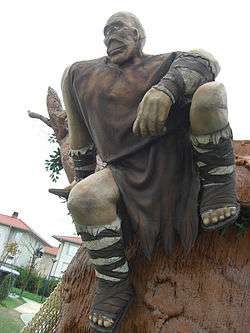Tartalo
In Basque mythology, Tartalo is an enormously strong one-eyed giant very similar to the Greco-Roman Cyclops. It is speculated that the name may derive from the Greek underworld Tartaros. He lives in caves in the mountains and catches young people in order to eat them. He also eats sheep. In Biscay, it's known as Alarabi. There is a story about him that appears to be derived from the Odyssey.
Wentworth Webster sees Celtic themes in such details as the talking ring he offers to his potential victims.
Story
One day, while two brothers of the Antimuño baserri were hunting, a storm broke, so they decided to take refuge from the rain in a cave, which was Tartalo's cave. Soon after, Tartalo appeared with his flock of sheep. He saw the two brothers and said: "one for today and the other for tomorrow".
That same day he cooked and ate the eldest one, and then, he went to sleep. While he was sleeping, the youngest brother stole Tartalo's ring and then he stuck the roasting spit in his only eye. Tartalo was blind, but not dead yet.
He started to look for the boy among his sheep, but he put on a sheep's skin and escaped from Tartalo. But, unluckily, when he got out of the flock of sheep, the accuser ring started to shout: "Here I am, here I am!".
Tartalo got out of his cave and he started to run after the ring, hearing its shouts. The young one wasn't able to take off the ring, so, when he arrived to the edge of a cliff, he cut off his finger, and since Tartalo was near, he decided to throw it down the cliff. Tartalo, following the ring's shouting, fell off the cliff.
Bibliography
- Barandiaran, Jose Miguel (1960): Mitología vasca, Madrid, Minotauro.
- Webster, Wentworth: Légendes basques, Anglet, Aubéron, 2005. ISBN 2-84498-080-5.
- Vinson, Julien: Le Folk-lore du Pays basque, Paris, Maisonneuve, 1883.
- Cerquand, Jean-François: Légendes & récits populaires du Pays Basque, éditions Aubéron, 2006. ISBN 2-84498-093-7
- Barbier, Jean: Légendes du Pays basque d'après la tradition, illustrations de Pablo Tillac, 1930, Delagrave, Paris. Republished by Elkar (1983), San Sebastián, Bayonne.
